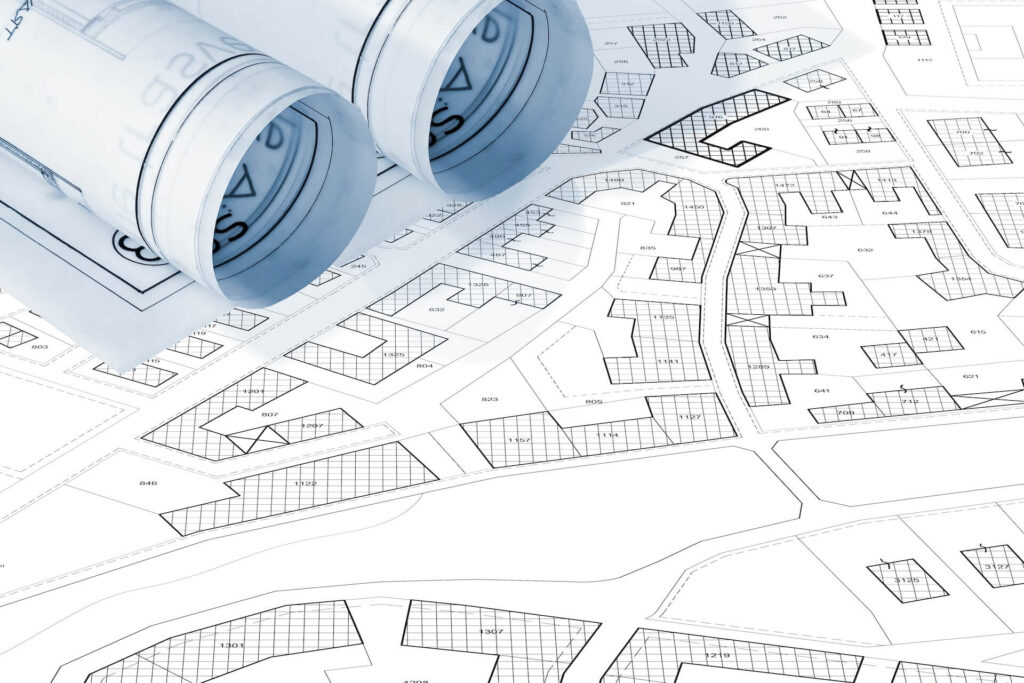Table of contents
- Relevant information at a glance
- Difference between corridor and parcel
- Finding a plot of land - these options are available
- Land parcels in the cadastre
- Parcels in the real estate valuation

Isar Estate
Founder: Dipl.-Kfm. Christian Dürr
Do you have a request? We are happy to be there for you and look forward to hearing from you.

A parcel is the smallest unit in the real estate register and is identified by a unique number. It forms the basis for the legally secure description of a property in the land register. Parcels provide important information on the location, size and use of a property and are therefore indispensable for determining value as well as for legal and structural inspections.
A parcel of land is a delimited part of the earth's surface in the cadastral sense and is recorded in the cadastral office on so-called parcel maps. This specific property unit is clearly defined in a public register and identified by an individual parcel number. The number acts as a unique identifier that distinguishes one parcel from another and makes it usable in legal and commercial transactions.
The nature of parcels of land can be varied. It can be an untouched area of land, part of a developed property or a mixture of both elements. It is important to know that a parcel of land does not necessarily have to be a single plot of land. A plot of land can also consist of several parcels.
The relationship between parcels of land and properties is of crucial importance. Parcels of land serve as the basis for identifying and measuring properties. In Bavaria and other German states in particular, they play a key role in the real estate market and urban development.
In the past, the parcel was defined as a landscape or as an area outside the forest. Today, in cadastral language, a parcel is understood to be the grouping of individual parcels within a district, whereby the district usually represents a town or municipality. The division into districts, parcels and parcels serves to provide a better overview and facilitates the assignment between the cadastral office and the land register.
The district is the smallest administrative unit in the real estate cadastre and comprises all parcels and parcels within a municipality or a specific area. It forms the basis for the allocation of parcels in the cadastre and in the land register. In the land register, each plot of land is listed with its district and parcel number, which enables clear identification. The land register is therefore of central importance for the legally secure documentation of ownership and property boundaries.
The parcel number is an exact designation of a parcel within a parcel. This ensures that a clear allocation is made within a district. It also contains important information about the property, such as its size, location and use. Today, parcel numbers are numbered consecutively within a parcel, although older parcels may still have a designation with numerator and denominator.
A parcel number is recorded in the land registry. This results in specific meanings that serve to identify and describe the parcel. The identification is an essential part of the real estate cadastre, which is managed by the cadastral authority. This is crucial for the clear identification, administration and transfer of land ownership.

There are various ways and means of finding out about a parcel of land or its condition:
- Online services of the regional land registry offices: By entering the parcel number, you can obtain information on the properties. In Bavaria, for example, the State Office for Digitization, Broadband and Surveying would be the right contact.
- Geoinformation systems (GIS): These enable the representation of parcels of land on digital maps. This allows you to obtain information on soil conditions and development plans.
- Notaries and lawyers: They provide valuable support for comprehensive research and are particularly useful for complex legal issues or large transactions. They also help to clarify the legal details of a parcel of land and ensure that all the necessary documents are provided.
As already mentioned, parcels of land play an important role in the land register and in land surveying. Here are the main functions and meanings in both areas:
In land surveying, parcels of land allow precise demarcation of properties. This is essential for spatial planning. Surveying provides important data that documents the use of the land, i.e. residential, commercial or industrial. This precise information is crucial for the planning and implementation of construction projects.
The land register confirms ownership of land and lists the owners of each parcel of land. Encumbrances such as mortgages or pre-emptive rights, which are essential for the valuation of land, are also entered here. This precise documentation ensures legal certainty and transparency in property transactions.
In Germany, the basic principles for recording and managing land parcels are largely standardized. However, there are regional differences due to the federal structure. The individual federal states have the authority to develop their own legal requirements and guidelines to meet local needs.
From a historical perspective, the relevance of clearly defining and cataloging land goes far back into the past. Even in ancient civilizations, it was essential to clearly define and document land, primarily for tax purposes. With the advent of the age of urbanization and industrialization in Europe, the need to precisely record and manage land finally arose.
Throughout history, the systematic collection and registration of parcels of land has developed into a central task. With innovative technologies such as GIS (geographic information systems) and GPS, parcels of land are now indispensable for the real estate trade. They form a crucial basis for the careful planning and implementation of infrastructure projects.

For many people without a specialist background, it is sometimes difficult to grasp the exact circumstances of a property and make a well-founded assessment of its actual value. For real estate agents, information from parcels of land is often the first approach to valuing a plot of land or a building. They use the parcel number to obtain precise information about a property. It is crucial to determine the size, location and exact boundaries.
The clear identifiability of a property in the land register via the parcel number is essential for the processing of real estate transactions. In addition, checking extracts from the land register to determine ownership is another important step if you want to sell a property in Munich. In the context of building law and urban planning, land parcels also provide information about existing building regulations and possibilities.
It is precisely in this complex interplay of cadastral data, land register extracts and legal requirements that the expertise of an experienced real estate agent such as Isar Estate proves to be extremely valuable. Our experts not only carefully analyze the relevant cadastral data, but also ensure that all legal and planning aspects are included in the valuation of a property. This sound basis is used to produce high-quality exposés that not only provide potential buyers with all the essential information, but also highlight the development potential of a property. If you do not wish to deal with this complex matter yourself, Isar Estate is at your side as a competent partner for real estate valuation in Munich and the surrounding area

Do you have questions about land or need help? At Isar Estate, you have the opportunity to receive detailed advice from an experienced real estate agent in Munich. We listen to you carefully and offer tailor-made recommendations. Contact us to find out more. We look forward to getting to know you.
Dipl.-Kfm. Christian Dürr
Founder Isar Estate
A parcel of land is the precise cartographic basis for every real estate transaction. It not only shows the exact location of a property, but also any special features such as access rights, divisions or unusual boundaries. It can also provide buyers with information on whether a property is connected to public roads or whether there are any restrictions, such as building encumbrances or easements.
In addition to the entry in the land register, the municipality's development plans are decisive. These regulate whether and how a plot of land may be built on - for example, the permitted building height, roof shape or use (residential, commercial, etc.). An experienced real estate agent from Isar Estate knows the relevant points of contact and can obtain the relevant information from the building authorities and interpret it professionally.
Yes, this is possible under certain conditions. However, a division or consolidation requires a survey by a specialist engineer and must be accepted by the land registry and recorded in the land register. These processes are particularly relevant for inheritances, project developments or property sales - we provide technical and organizational support for such steps.
Disclaimer
Despite careful research and checking of the sources, the author assumes no liability for the accuracy and completeness of the information presented. In case of unclear legal and tax questions, it is advisable to consult a lawyer and/or tax advisor for clarification.
Author: Dipl.-Kfm. Christian Dürr
Image credits: shutterstock: 2122615367, 2248884979, 1909639102